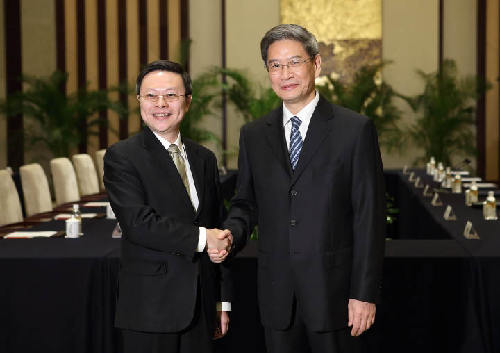Cross-Straits Step Forward

SOME are calling it a major breakthrough, even a milestone.
This is true, in the sense that it was the first time in six decades that representatives of the administrative authorities on both sides of the Taiwan Straits met in their official capacities.
Others are cautioning against unrealistic anticipation of the outcome, which also holds true given the complicated context and subtle nature of such a meeting.
The February 11 meeting between Wang Yu-chi, head of Taiwan’s Mainland Affairs Council, and Zhang Zhijun, director of the mainland’s Taiwan Affairs Office, was rich in political symbolism. But in and of itself, it was not about politics.
As Wang and Zhang later revealed, their talks concentrated on technical concerns. This was no surprise, since Taiwan’s legislative authorities had effectively ruled out anything politically significant.
Still, as many have observed, the materialization of the meeting is a remarkable step forward in benign interactions across the Straits; a step worth celebrating.
The meeting will go down in history less because of what Wang and Zhang discussed, but because of the very fact that they met. Prior to this meeting, policy consultations between the two sides had been conducted on a party-to-party basis, or through semi-official institutions.
High-level interactions between Taiwan’s Kuomintang and the Communist Party of China on the mainland, as well as those between Taiwan’s Strait Exchange Foundation and the mainland’s Association for Relations Across the Taiwan Straits, have promoted bilateral exchanges to previously inconceivable heights at unimaginable speed, over the past six years in particular. It is this continuous accumulation of mutual goodwill that has brought cross-Straits ties to where they are now, and made the meeting between Wang and Zhang possible.
Their meeting will in turn deepen and enhance mutual goodwill. Because, with the administrative authorities on both sides of the Straits coming to the fore, direct, and therefore more efficient, communication will make many things easier.
It is naive to place too much expectation on one single meeting. It will take strenuous efforts from both sides to build up mutual political trust commensurate with their economic interdependence and the wishes of the peace-and-stability-minded public in both Taiwan and the mainland.
Yet, it would be a tremendous feat if this meeting could initiate an institutionalized mechanism of direct official contacts.
Which is why we see this meeting as a promising new starting point.
Published on Chinadaily.com.cn on February 11, 2014
Services
Economy
- Are You Ready to Perform?
- Beijing’s Green Courtyard
- China’s CSR on the Global Market Fast Track – An Interview with Xu Zongxiang, vice president of China South Locomotive & Rolling Stock Corporation Limited (CSR)
- China’s Changing Development Pattern
- China Accelerates Transformation of Its Economic Development Model
